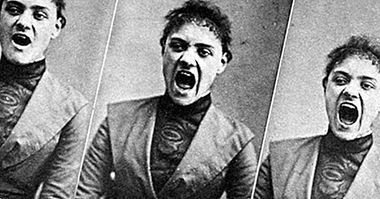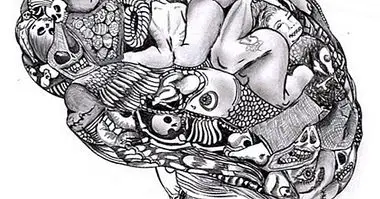The 4 differences between shyness and social phobia
We meet a person who does not dare to express himself or speak in public and who keeps the expression of his thoughts inhibited. This person suffers from it and finds it difficult to relate and defend their position. Why does it cost so much? Some interpret that this person is extremely shy, while others consider that they have social phobia. But what are the differences between one thing and another?
To this end we will make a brief definition of each of the two concepts, to later focus on the Differences between shyness and social phobia .
- Related article: "Social phobia: what is it and how to overcome it?"
What do we understand by shyness?
The shyness it is a personality characteristic present in a large number of people in which the subject who owns it has difficulty expressing himself in public and bonding with his peers, which involves a certain effort and often generates anxiety.
These kinds of people tend to be quiet not because they have nothing to say but because they are afraid to do so because of the possibility of being judged negatively.
It is not that the shy person is introverted (in fact timid people can actually be very extraverted), but because of fear they have extreme caution about what they say and to whom, and do not dare to expose their views with firmness. These people may feel insecure and uncomfortable in social situations, and usually do not deal with large groups of strangers.
A shy person can suffer from such shyness by causing some isolation and limitation of social life. However, shyness is not considered a pathology unless it is taken to the extreme and actively avoid social situations or generate symptoms such as anxiety crisis to have.
Social phobia
Social phobia or social anxiety disorder is a disorder linked to anxiety in which the subject who suffers it has an irrational and persistent fear to expose himself in social situations or to certain people, due to the fear of being judged or perform some action that makes them look ridiculous.
The person tries as much as possible avoid social situations and he feels a high level of anxiety if he is forced to participate in such situations, being able to get to experience anxiety crisis. The person recognizes that their fear is irrational, and is not due to other disorders or substance use.
This disorder can occur in a generalized manner or by circumscribing panic to specific situations such as making an exhibition or a specific type of activity in public.
Differences between shyness and social phobia
As we can see from the definitions of shyness and social phobia, both concepts are similar in the core of the concept: in both cases the person suffers a fear of being judged socially by their acts or words, inhibiting their interaction with their peers to some degree and causing this a more or less severe limitation of the expression and social connection.
In fact, it is sometimes considered that Social phobia is the pathological extreme of shyness , and it is not strange that personalities with a high level of shyness in childhood can develop in the future social phobia (although it does not have to happen).
Despite the similarities mentioned above, we can find different differences between shyness and social phobia, with some of the main ones being the following.
1. The non-avoidance of social interaction
First, shyness is a personality characteristic more or less stable throughout life, although it can be reduced as the subject's life experience varies. But even though it can produce some limitations it is not considered a disorder .
Social phobia implies the presence of a high level of fear to confront social situations that provoke their avoidance in a continuous and persistent way. However the shy person does is able to carry out an interaction in social situations and even if you do not feel safe in such contexts, you do not avoid them so actively. For example, the shy one may go to a party even if he does not talk much, but the phobic will avoid it if he can.
2. The widespread fear
Another point in which both concepts differ is that while the shy person often feels uncomfortable before specific situations or people, in social phobia fear and tends to be more widespread (even if we are talking about a circumscribed phobia).
3. Physiological differences
A third point of contrast is the presence of symptomatology at the physiological level . A shy person may suffer from blushing, sweating, gastrointestinal discomfort and some nervousness when exposed, but in general, no major alterations are generated.However, in the case of social phobia, tachycardias, respiratory difficulties and severe anxiety crises can be experienced not only when confronted with the situation, but also when imagining it in advance.
4. The intensity of the limitation
Finally, the shy person may suffer at a certain time because of the perception of inability to relate or defend their point of view, but in the case of a social phobia fear and concern they are more continuous and limiting their quality of life .
Thus, someone shy may prefer to cross a street instead of the one that is a few meters away to not meet someone, while a person with social phobia is able to not leave home to know that at that time a person who likes coming back from work and could find it by chance.



















